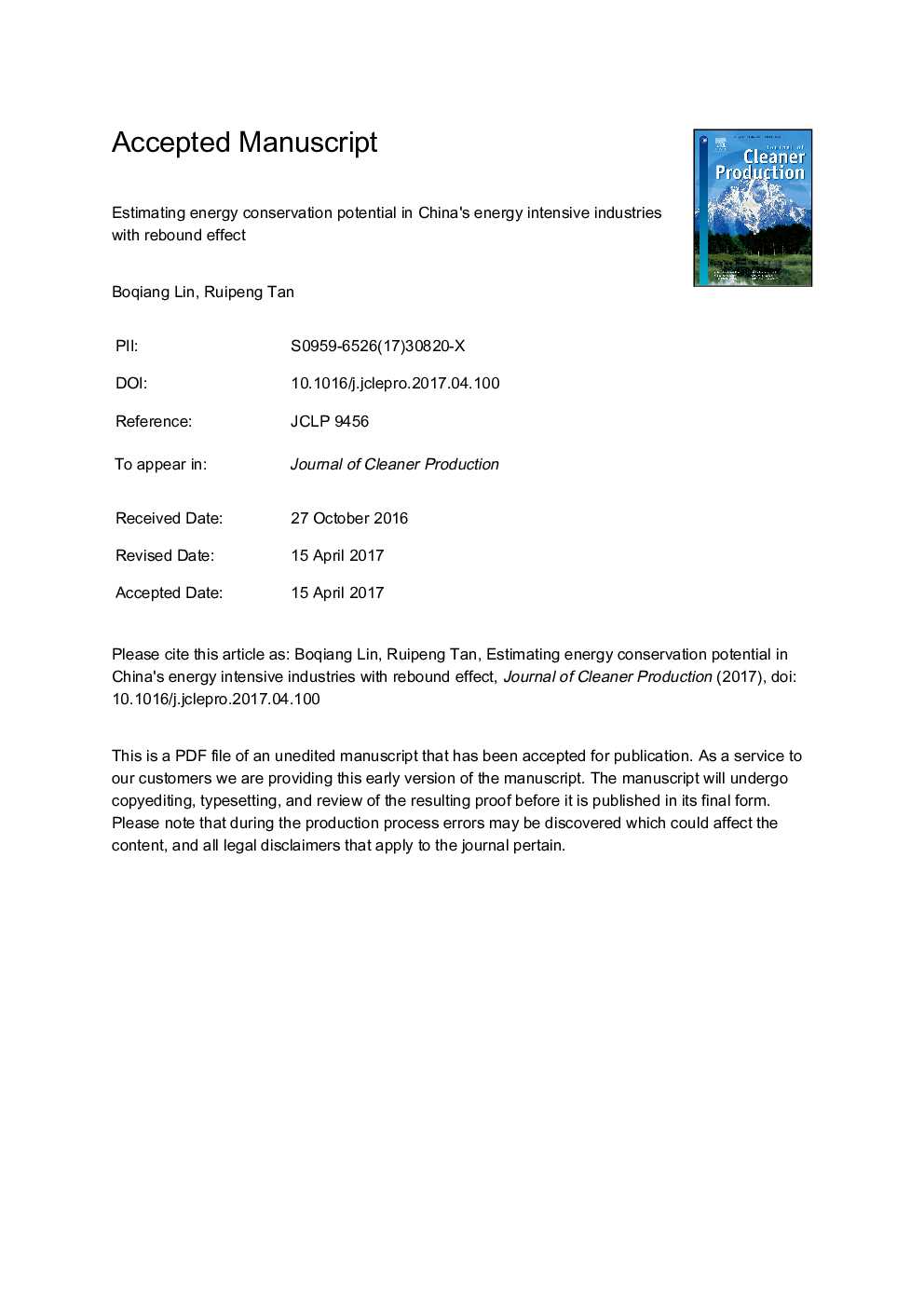| کد مقاله | کد نشریه | سال انتشار | مقاله انگلیسی | نسخه تمام متن |
|---|---|---|---|---|
| 5481044 | 1522098 | 2017 | 51 صفحه PDF | دانلود رایگان |
عنوان انگلیسی مقاله ISI
Estimating energy conservation potential in China's energy intensive industries with rebound effect
ترجمه فارسی عنوان
برآورد پتانسیل صرفه جویی در انرژی در صنایع انرژی فشرده چین با اثر بازده
دانلود مقاله + سفارش ترجمه
دانلود مقاله ISI انگلیسی
رایگان برای ایرانیان
کلمات کلیدی
چین صنعت انرژی فشرده، روش هم سازگاری، اثر بازگشت انرژی، رویکرد متغیر نامحدود، پتانسیل ذخیره انرژی
ترجمه چکیده
مصرف انرژی شش بخش عمده صنایع پر انرژی چین حدود نیمی از کل مصرف انرژی ملی است و در سالهای اخیر بیش از 70 درصد مصرف انرژی صنعتی را شامل می شود. این شش صنایع سرمایه و انرژی فشرده است و تأثیر زیادی بر مصرف انرژی چین دارند، بنابراین آنها به طور مستقیم به دستیابی به هدف ذخیره انرژی در برنامه پنج ساله 13 مربوط می شوند. در این مقاله عوامل موثر بر مصرف انرژی در صنایع با استفاده از روش هم اندیشی مورد بررسی قرار گرفته و قابلیت صرفه جویی در مصرف انرژی را با توجه به اثر بازدارندگی انرژی تخمین می زند. نتایج نشان می دهد که تولید ناخالص داخلی و مقیاس صنایع عامل های قطعی افزایش مصرف انرژی هستند، در حالیکه شدت تحقیق و توسعه آن را کاهش می دهد. قیمت انرژی تاثیر کمی در مصرف انرژی دارد. میانگین تأثیر بازده انرژی با استفاده از متغیر پنهان محاسبه شده و نتیجه 90.75٪ می باشد. با توجه به تأثیر بازگشت انرژی، پتانسیل حفاظت از انرژی صنایع انرژی چینی در سال 2020 برابر با 14/18 تا 26/54 میلیون تن معادل ذغال سنگ استاندارد در سال 2020 و 44/64 تا 80/72 میلیون تن معادل ذغال سنگ استاندارد در سال 2030 خواهد بود.
موضوعات مرتبط
مهندسی و علوم پایه
مهندسی انرژی
انرژی های تجدید پذیر، توسعه پایدار و محیط زیست
چکیده انگلیسی
The energy consumption of China's six most energy-intensive sub-industries is about half of the total national energy consumption, and accounts for more than 70% of industrial energy consumption in recent years. These six industries are capital and energy intensive and have a great impact on the energy consumption of China, so they are directly related to the achievement of the energy conservation goal in the 13th Five Year Plan. This paper investigates the influential factors of energy consumption in the industries by employing the cointegration method, and estimates the possible energy conservation potential considering energy rebound effect. The results show that GDP and the scale of industries are the deterministic factors increasing energy consumption, while R&D intensity decreases it. Energy price has little impact on energy consumption. The average energy rebound effect is calculated using the latent variable approach and the result is 90.75%. Considering energy rebound effect, the energy conservation potential of China's energy intensive industries is 14.18-26.54 million tons of standard coal equivalent in 2020 and 44.64-80.72 million tons of standard coal equivalent in 2030.
ناشر
Database: Elsevier - ScienceDirect (ساینس دایرکت)
Journal: Journal of Cleaner Production - Volume 156, 10 July 2017, Pages 899-910
Journal: Journal of Cleaner Production - Volume 156, 10 July 2017, Pages 899-910
نویسندگان
Boqiang Lin, Ruipeng Tan,
